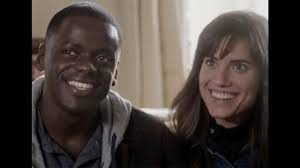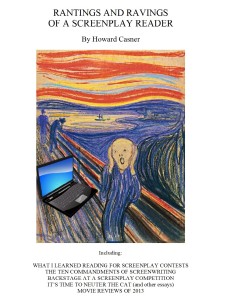THE FEMALE OF THE SPECIES: Movie Reviews of Get Out and You’re Killing Me, Susana by Howard Casner
Posted: March 6, 2017 | Author: Donald | Filed under: Uncategorized | Tags: Allison Williams, Bradley Whitford, Catherine Keener, Daniel Kaluuya, Gael Garcia Bernal, Get Out, Jordan Peele, José Augustin, Lil Roy Howery, Luis Camera, Roberto Sneider, Stephen Root, Susana, Veronica Echegui, You’re Killing Me | 1,517 Comments »For questions: hcasner@aol.com
First, a word from our sponsors: I am now offering a new service: so much emphasis has been given lately to the importance of the opening of your screenplay, I now offer coverage for the first twenty pages at the cost of $20.00. For those who don’t want to have full coverage on their screenplay at this time, but want to know how well their script is working with the opening pages, this is perfect for you. I’ll help you not lose the reader on page one.
Ever wonder what a reader for a contest or agency thinks when he reads your screenplay? Check out my new e-book published on Amazon: Rantings and Ravings of a Screenplay Reader, including my series of essays, What I Learned Reading for Contests This Year, and my film reviews of 2013. Only $2.99. http://ow.ly/xN31r
and check out my Script Consultation Services: http://ow.ly/HPxKE
Warning: SPOILERS
 Get Out, the new horror/thriller from writer/director Jordan Peele (you know him, he’s the half of the duo of Key and Peele who doesn’t get the Emmy nomination for acting), has a rather interesting and new take on race relations.
Get Out, the new horror/thriller from writer/director Jordan Peele (you know him, he’s the half of the duo of Key and Peele who doesn’t get the Emmy nomination for acting), has a rather interesting and new take on race relations.
In this film in which black characters are tricked by a whiter than white upper middle class princess to come to the country to meet the folks, the princess’ father tells our hero Chris Washington that for some reason, possibly genetic, but he and none of his cohorts know why really, the black race is surpassing and often has surpassed the white race.
So what choice does the superior white race have if they want to survive? Read the rest of this entry »
THE COURSE OF TRUE LOVE NEVER DID RUN YADDA, YADDA, YADDA: Movie reviews of Begin Again, The Empty Hours and A Summer’s Tale by Howard Casner
Posted: July 30, 2014 | Author: Donald | Filed under: Uncategorized | Tags: A Summer’s Tale, Aaron Fernandez Lesur, Adam Levine, Adriana Paz, Amanda Langlet, Aurelia Nolin, Begin Again, Blaise Pascal, Catherine Keener, Eric Rohmer, Gwenaelle Simon, Hailee Steinfeld, James Cordon, John Carney, Keira Knightley, Kristyan Ferrer, Marc Ruffalo, Melvil Poupaud, Once, The Empty Hours | 1,151 Comments » First, a word from our sponsors. Ever wonder what a reader for a contest or agency thinks when he reads your screenplay? Check out my new e-book published on Amazon: Rantings and Ravings of a Screenplay Reader, including my series of essays, What I Learned Reading for Contests This Year, and my film reviews of 2013. Only $2.99. http://ow.ly/xN31r
First, a word from our sponsors. Ever wonder what a reader for a contest or agency thinks when he reads your screenplay? Check out my new e-book published on Amazon: Rantings and Ravings of a Screenplay Reader, including my series of essays, What I Learned Reading for Contests This Year, and my film reviews of 2013. Only $2.99. http://ow.ly/xN31r
Warning: SPOILERS
Ah, love. You can’t eat it, but without it, you’ll starve. You can’t drink it, but without it, you’ll never feel quenched. You can’t wear it, but without it, you feel naked. You can’t sleep under its roof, but without it you’ll feel homeless.
And when it comes to love and war, well, let’s face it, love is the more universal language (why else do you think Shakespeare in the Big L won the Oscar over Saving Private Ryan?).
A few films have opened lately that explore the idea of love (and in once case amor and in another case amour), or more accurately, how absolutely awful and moronic we are at it. Perhaps one of the themes that connects all three movies is reflected in Hal David’s lyrics from the musical Promises, Promises, “So for at least until tomorrow/I’ll never fall in love again”.
Whether, then, these stories are comedies or tragedies (or both) is up to you.
Okay, enough of the poetry crap. Or as Ewan McGregor’s character says in I Love You Phillip Morris: Enough romance, let’s fuck. Read the rest of this entry »
Movie Reviews of ENOUGH SAID and THE FIFTH ESTATE by Howard Casner
Posted: November 4, 2013 | Author: Donald | Filed under: Uncategorized | Tags: Ben Falcone, Benedict Cumberbatch, Bill Condon, Catherine Keener, Dan Stevens, Daniel Bruhl, David Thewlis, Enough Said, James Gandolfini, Josh Singer, Julia Louis-Dreyfuss, Moritz Bleibtrau. Laura Linney, Nicole Holocener, Peter Capaldi, Stanley Tucci, The Fifth Estate, Toni Collette, Wikileaks | 854 Comments »There is a sculpture in Chicago in front of City Hall. It’s by Picasso. It’s okay. I thought it was rather derivative and that there wasn’t anything that special about it. To be honest, what I thought when I first saw it was that Chicago paid a fortune to get the great artist to create a sculpture just for the city and all we got was…a Picasso. And I thought we deserved more.
I have now seen every one of writer/director Nicole Holocener’s movies, and I’ll definitely keep on seeking future ones out. I’ve enjoyed them well enough, and her dialog and characterizations are strong, insightful and full of empathy, something most movies seem to lack these days (though I do wish she would do something about her flat and routine visual style).
At the same time, though, I am finding myself, well, wanting more than enjoying them well enough. I find myself so wanting her to take a leap forward, so wanting her to make her Annie Hall, her Dogma, her Raising Arizona or Fargo, her Pulp Fiction, her Lost in Translation. Instead, what we’re getting here, in her new film, Enough Said, is…a Picasso. And it’s a good film, but it’s also just…a Picasso.
The basic story revolves around Eva (a perky Julia Louis-Dreyfuss), a divorced mother who makes a living as a masseuse, who meets two people at a party: the refined, somewhat snobby poet Marianne (Catherine Keener, and what movie by Holocener would be complete without Keener in it) and the less refined, teddy bear Albert (James Gandolfini in his next to last film performance, which gives the whole thing an unintended, but somewhat, whimsical sadness to it). Marianne hires Eva to massage her and the two become good friends. Albert asks Eva out and they become lovers. What Eva quickly finds out, but the others don’t know, is that Eva and Albert are bitter, bitter, bitter exes who keep telling Eva how awful a mate the other one was.
In other words, the basic set up is a farce and it’s a great idea. Unfortunately, the pacing is anything but. And after while, I found myself antsy because all I was waiting for was the big reveal. And it took what seemed a longer than necessary period of time to get there.
I’m also not sure I fully bought the relationships either. And I don’t mean the present tense ones. The more Marianne and Albert talk about each other behind each others’ backs, Eva never seems to ask the most logical question of the story: why did they ever get married in the first place? They seem to be the last two people who would ever go out on a first date, must less tie the knot.
Eva and Albert’s relationship is a bit more convincing because both Louis-Dreyfuss and Gandolfini work very hard at it and there is a sweet chemistry to the two of them. At the same time, I sometimes got the feeling they started a relationship simply because there wasn’t anyone else around. In the end, the most convincing couple in the room are Sarah and Will (Toni Collette and Ben Falcone), Eva’s best friends and comic relief. They seem so right for each other and Collette and Falcone give razor sharp performances, they’re the kind of couple who get each other even when they get on each other’s nerves.
In the end, maybe Holocener isn’t that interested in making that leap forward. That may not be the direction she wants to go in. And I guess there’s nothing wrong with that. Maybe that’s okay. And maybe it’s just a prejudice of mine that artist’s should take leaps forward. But god, I so wish she would. We have enough Picassos.
The Fifth Estate, written by Josh Singer and directed by Bill Condon, is a hi-tech espionage thriller disguised as a bromance, or a bromance disguised as a hi-tech espionage thriller. I’m not sure which. I’m not sure I want to know.
For those of you just returned from the Antarctic, The Fifth Estate is about the Private Lives relationship (you know what I mean, can’t live with, can’t live without type thing) between Julian Assange and Daniel Berg, the creators of the king of all hacker sites Wikileaks. And what a relationship it is, too. Like any good Fred Astaire/Ginger Rogers movie, they meet cute; flirt; get jealous of each others’ lovers; try to sabotage each others’ relationships; cheat on each other; have make-up sex (in the form of releasing a shocking video of the American military shooting and killing unarmed civilians and journalists—it was good for me, was it good for you, too?). The love affair metaphor here is so heavy handed that it is embarrassing and even cringe worthy at times (you almost want to yell at the screen, “get a room, already, why don’t you”). At one moment I expected Assange to say “You complete me” to Berg and Berg to say to Assange, “I wish I could quit you”. The only place it really deviates from formula is that unlike most rom coms, The Fifth Estate has an unhappy ending as Berg, like any good starter wife, gets traded in for a younger model.
If this movie had been made in the 1950’s, I would have expected it to star Joan Crawford or Barbara Stanwyck and Zachary Scott or Fred MacMurray. Instead we have Benedict Cumberbatch as Assange (with shocking white hair as if he were an elf extra in the Lord of the Rings) and Daniel Bruhl as Berg. There’s absolutely no chemistry between the two and their characters just never come to life (though I have to say in Cumberbatch’s defense, he is stuck with imitating someone with one of the dullest speaking voices in some time).
And poor Berg. After giving some solid and satisfying performances in such films as Good Bye Lenin!, The Edukators and Inglorious Basterds, he just can’t seem to find a role that suits him. And it doesn’t help that here he can’t get any more heat going with his co-star than he could with Chris Hemsworth in Rush, another Beatrice/Benedict relationship that also couldn’t get off the ground (or out of the starting gate).
It’s all so unfortunate. Because when the film focuses on the actual Wikileaks story, it’s rather exciting. Condon’s direction just refuses to let the action lag and the whole thing is filled with a bunch of fun visuals to keep the tension, well…extremely tense. But whenever the thriller returns to the love story, the whole thing sinks like the Titanic, taking its two stars with them.
I must say, though, it does have an interesting supporting cast. Some surprising people keep popping up, like the future Dr. Who, Peter Capaldi; Mike Leigh refugee, David Thewlis; Downton Abby ex, Dan Stevens; and the wonderful Moritz Bleibtrau, one of Germany’s best actors (Run, Lola, Run; Munich; and the Baader Meinhoff Complex).
It also has Laura Linney and Stanley Tucci as U.S. state department officers who, for some reason, always feel a tad out of sync with the rest of the movie. Part of this may be because they are too familiar of actors for their roles. But part of it may be because they give the most vibrant line readings and their platonic romance is infinitely more believable than Cumberbatch’s and Bruhl’s.
Movie Reviews of THE ORANGES and DIANA VREELAND: THE EYE HAS TO WANDER by Howard Casner
Posted: October 13, 2012 | Author: Donald | Filed under: Uncategorized | Tags: Alia Shawkat, Allison Janney, Annette Miller, Bent-Jorgen Perlmutt, Catherine Keener, Diana Vreeland: The Eyes Has To Wander, Frederic Tcheng, Hugh Laurie, Ian Helfer, Immordine Vreeland, Jay Reiss, Julian Farino, Oliver Platt, The Oranges | 5 Comments »The Oranges, the new film written by Ian Helfer and Jay Reiss and directed by Julian Farino, feels as if it’s about a group of suburbanites who would like to be in a John Updyke book, but can’t seem to get up the energy for it. It’s a character study of three marriages, two straight ones as well as the Boston or faux homosexual one of the two husbands. And if you don’t know which one is of most concern to the writers, then you obviously have never heard the term bros before hos. The movie is all about what happens when one husband starts an affair with the other husband’s daughter. At least I assume it’s an affair. No sex is shown and it all ends up being a bit cute and cuddly, as if they were afraid the Lifetime channel might not want to air it. The whole thing is narrated by Alia Shawkat, who plays the daughter who doesn’t have an affair. Exactly why this character was chosen for this somewhat thankless task is a bit unclear. The movie is filled with scenes she doesn’t see first hand and she never seems to learn anything of any significance. The movie might have been interesting if it had been about her realization that nobody likes or cares about her because she’s too plain and dull to be of any importance (so unimportant that even her father prefers the daughter across the street). But alas, twas not to be. The leads are played by Allison Janney, Oliver Platt, Catherine Keener and Hugh Laurie. All are very good, but apparently all are here because no one has come up with the idea of using them for a movie version of Edward Albee’s A Delicate Balance yet. Maybe next year.
Diana Vreeland: The Eye Has to Travel (the new documentary directed by Lisa Immordine Vreeland, Bent-Jorgen Perlmutt and Frederic Tcheng) is about the ground breaking American fashionista that revolutionized the way we thought about what we wear though the pages of Harper’s Bazarre, Vogue and the Metropolitan Museum of Art. In the movie, Vreeland is portrayed as Auntie Mame meets Anna Wintour: someone who cries out Live!, Live!, Live!, but still makes her assistants cry. It’s based on an as told to biography written by George Plimpton and is narrated by two people pretending to be Plimpton and Vreeland reading excerpts of the book and the interviews. The actor playing Plimpton is fine, but Annette Miller, as Vreeland, is a bit much at times. She has the voice of Lauren Bacall coupled with the vocal inflections of Bette Davis. I’m not convinced the film rises about what is, a fairly standard bio doc, but it is highly entertaining and at times fascinating (though one does get a chill here and there when Vreeland seems to see her sons as utterly unimportant to her life).












